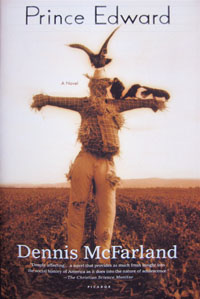
PRINCE EDWARD
Henry Holt Reading Group Guide Questions for Discussion:
1. As in the classic novel, To Kill a Mockingbird, Prince Edward explores the ways in which racial issues, in this case desegregation, affect the children in a community. How are Ben and Burghardt introduced to the realities of prejudice?
2. Ben states early in the novel that he "didn't distinguish between opinions and beliefs," that what you believed and stood for might serve to isolate you as much as include you. Ben also remarks that being a man means knowing what is expected of you when no one tells you. Does the novel indicate Ben will be more broad-minded than his family, or is it merely youth and innocence that allows him to contemplate other ways of approaching life?
3. Ben is concerned that his sister Lainie won't actually love anything, that she will only desire what she doesn't have. Discuss their relationship to each other, and to the other members of the family. How does Lainie overcome the restrictions and repressions of her upbringing?
4. Julius's stance on slavery (page 80) is "if it weren't for the white folks they'd still be in Africa." Where does he draw the line between gratitude, and resentment for enduring a life of complete subservience?
5. Al tells Ben that white people are concerned only with having a whole race of people they can feel superior to, to make them feel better about their own lives. Why does he not have the courage of his convictions?
6. On page 277 Ben says, "I believed Daddy Cary has got what was coming to him." Why does Ben lie about the incident in the barn with Daddy Cary and Julius? What motivates Daddy Cary to tell the story that he fell?
7. The leaders of the resistance to segregation in the county appear all to be men. What seems to be the position of women in Prince Edward society?
8. Imagine the scene between Lainie and her mother, which occurs off stage, when she tells her about the abortion.
9. What are the hallmarks of Ben's friendship with Burghardt that indicate the unspoken boundaries and limits of their friendship? Reverend Griffin tells Ben the story of playing with white boys as a kid (page 248), when, after their mothers 'talked,' the boys lost touch. He describes this as 'growing up.' Is this what will happen to Ben and Burghardt?
10. The author has produced a time capsule of the year 1959 with the issue of desegregation at the forefront, a time when Alaska and Hawaii have recently become states. The novel is set almost fifty years ago, and yet one wonders how far we have come as a country. Discuss the similarities and differences between then and now.
11. Discuss the ways in which Ben is constantly put in the path of moral dilemma: Granny Mays' stolen books, Daddy Cary's abuse of Burghardt. Al talks about not having anything against colored people, yet, like his mother, he goes along with his elders.
